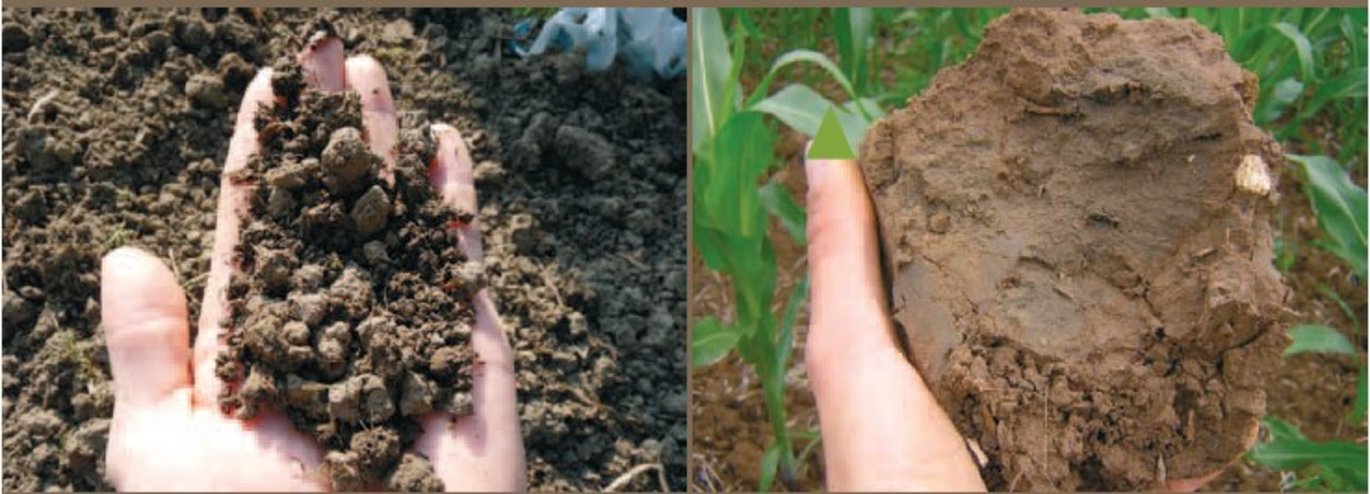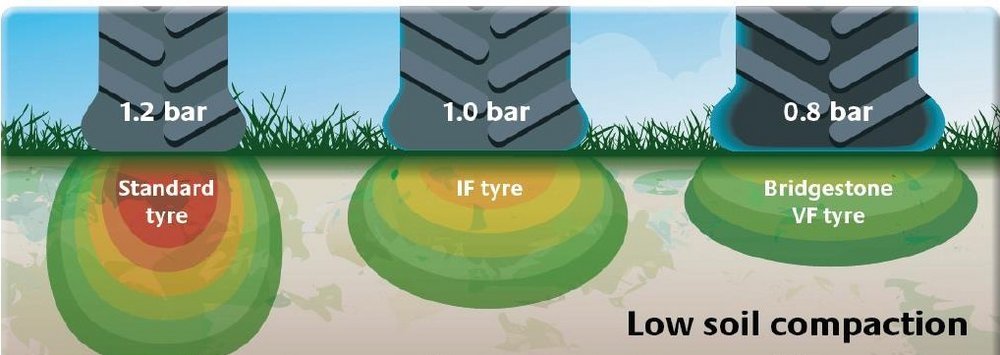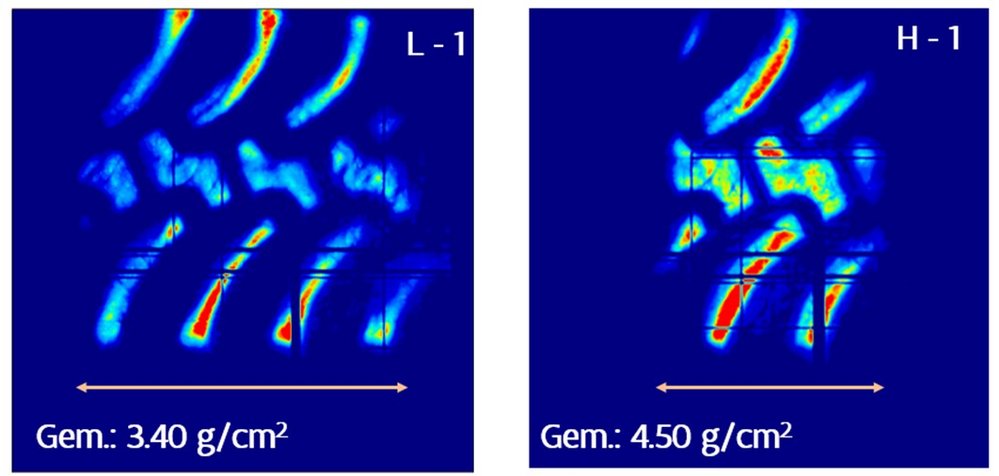Belgian tyre producer partners with ILVO to further evolve and educate on anti-soil compaction tyres
With soil compaction being one of the biggest threats for agricultural soils both at present and in the future, and a problem that is not easily undone once it is there, there is an urgent need for soil management practices that prevent soil compaction as much as possible. This is why the Belgian branch of tyre and agricultural machinery producer Bridgestone partnered up with Flemish research institute ILVO to share their expertise on tyre techniques that can prevent soil compaction.

34% of Belgian farmers have problems with soil compaction, and 80% report its negative impact on their income. A risk assessment analysis on Flemish agricultural soils, between 20 and to 50% of these soils are highly vulnerable to soil compaction. Large parts of these (agricultural) soils are already suffering from the phenomenon, often caused by years of unrestricted soil management practices with heavy machinery. The weight of this machinery causes the soil to restructure itself to be able to withstand the pressure, mostly forming a problem in the -30 to -60 cm layer, where cultivation techniques that loosen up the soil do not reach. As a consequence, the soil can be pressed more and more tightly together.
Soil compaction occurs when soil particles are pressed together, reducing pore space between them. Heavily compacted soils contain few large pores, less total pore volume and, consequently, a greater density. A compacted soil shows a reduced rate of both water infiltration and drainage, an increased risk of aeration-related problems and a restricted root growth.
Manual mechanical devices called penetrologgers can be used to measure the resistance to penetration of a certain soil, which is one of the most impactful expressions of soil compaction. Values of 4 MPa (the unit for soil resistance to penetration) and even higher are no exception in Flemish soils. This is particularly disturbing if we consider that when the resistance to penetration reaches values higher than 3 MPa, root growth can be slowed down, and even inhibited.
Considering our soil’s huge role in delivering ecosystem services and producing healthy plants, soil compaction poses a serious threat on agricultural production and therefore our economy. At European level, reported harvest losses as a result of soil compaction range between 5 and 35% (EEA), and run even higher in specific situations. 34% of Belgian farmers indicate they have problems with soil compaction, and 80% of those acknowledge that this has affected their income negatively (RAI-SOILCOMP, 2015).
The damage of wheels
Wheel traffic is without a doubt the major cause of soil compaction. Over the last sixty years, harvesters’ wheel loads have increased from ~1.5 Mg (Megagram) to 9 Mg, and that of tractors from ~1 Mg to more than 4 Mg. Moreover, with increasing farm size, there is often a limited window of time to execute farming practices (e.g. tillage, manure application, harvest) causing several operations to be performed before the soil is sufficiently dry to support heavy machinery.
In an interview with Bruno De Filette from the Belgian branch of tyre production company Bridgestone, he told us that this was the main reason for the company to decide to actively help to not only prevent soil compaction, but also to reduce CO2 emissions and maximize agricultural land use efficiency. “All of this fits within the frame of our mission to help our customers to feed the ever-growing world population in a sustainable, but also cost-efficient way”.
In the context of that philosophy, the Belgian branch of Bridgestone (as well as fellow tyre producers Michelin and Alliance, and multiple other stakeholders) entered into a partnership with Flemish EJP Soil partner ILVO in a soil compaction and remediation project. In this research project that kicked off in 2018, ILVO (together with Ghent University, Soil Service of Belgium and Inagro) aims to find good practices in regards to cultivation techniques and mechanisation for prevention and remediation of soil compaction, in collaboration with relevant stakeholders from farmers and contractors to machine/tyre producers and distributors. Key elements of the project are investigating the economical balance in the application of these good practices, increasing awareness among farmers, and spreading the gained knowledge to stakeholders.

Prevention over cure
It is important to note that as far as fighting soil compaction goes, prevention is far preferable and more attainable than remediation, as it is much harder to reverse damage done. Tommy D’Hose (ILVO, coordinator of the project on soil compaction prevention and remediation): “A large portion of the soil compaction damage that we see in Flanders has been caused by agricultural machinery. We know the trend is going towards bigger and heavier machines, so we need to identify ways to prevent further damage from these heavy vehicles as much as possible”. For this prevention side of the project, Bridgestone offered their expertise and experience in the production and use of tyres designed to do just that: prevent soil compaction.
Tyres against soil compaction
For years, companies like Bridgestone, Michelin and Alliance have been producing agricultural tyres that not only comply with but also actually exceed European VF standards (created by ETRTO – European Tyre and Rim Technical Organisation). These tyres are designed in a way that maximises their contact surface on the soil and minimizes tyre pressure per unit area. This allows the machine to carry the same load as it could with standard tyres while exerting significantly less pressure on the soil. In fact, knowing that the compression resistance (meaning: how much pressure can a patch of soil carry before soils compaction occurs), of most soils is 1 bar, and most standard tyres exert 1.2 bars of pressure, these VF tyres with their 0.8 bars of pressure can make a world of difference.

Source: Bridgestone
Aside from producing and distributing these tyres, De Filette mentions that Bridgestone puts a lot of effort into educating their clients and increasing awareness of soil compaction issues and good soil management practices. Right now about 20% of their European tyre sales consist of low pressure VF tyres, and the company sees an increase in these numbers every year.

Pressure mat images from measurements with trailer tyres at ILVO, left: low tyre pressure; average soil pressure of 3.40 g/cm2; right: high tyre pressure; average soil pressure of 4.50 g/cm2
De Filette: “Not only are farmers slowly realising the impact of soil compaction for crop yield and income as well as for the environment, but we are also making them aware of the other advantages that lower pressure tyres offer. Since these tyres do not sink into the soil as deeply as a standard tyre, the machine is able to get across the field a lot swifter and quicker, saving fuel and time.” ILVO and Bridgestone partnered up to set-up tests that allow to investigate how the VF tyres impact the soil and to get more insights on other potentially beneficial effects. “It is important to show the practitioners that actually need to get to work with these management practices not just what they should use because it is better for the environment, but also why it is interesting for them personally and economically, and how it will help them in their day to day tasks, in a cost efficient way.”
Interactive approach with research develops guidelines for good practices
“This is exactly where the advantages of a programme like EJP SOIL come in”, says Greet Ruysschaert, ILVO researcher and Flanders representative for EJP SOIL. “The overall goal of this programme is to design a roadmap for implementation of climate-smart sustainable soil management practices, but this is impossible without stakeholder involvement.” Just like Mr. De Filette, Dr. Ruysschaert believes that this involvement is essential while developing guidelines for good practices. “Even though Bridgestone as a company is not directly involved in EJP SOIL so far, they are one of many that will ultimately benefit from this interactive approach between research, policy, farmers and industry. De Filette: “Partnering up with ILVO is a logical consequence of an important part of our philosophy. The growing pressure that population growth, climate change and (agricultural) land scarcity pose on farmers and their incomes is inevitable, and soil preservation plays an essential role in coping with those challenges. Collaborations with researchers and staying close to new possibilities and evolutions are our way to guarantee to our customers that our products can play an optimal role in their need to adapt to these tendencies and needs.”
For more information about the soil compaction and remediation project between the Belgian branch of Bridgestone and ILVO in: https://www.bodemverdichting.be/